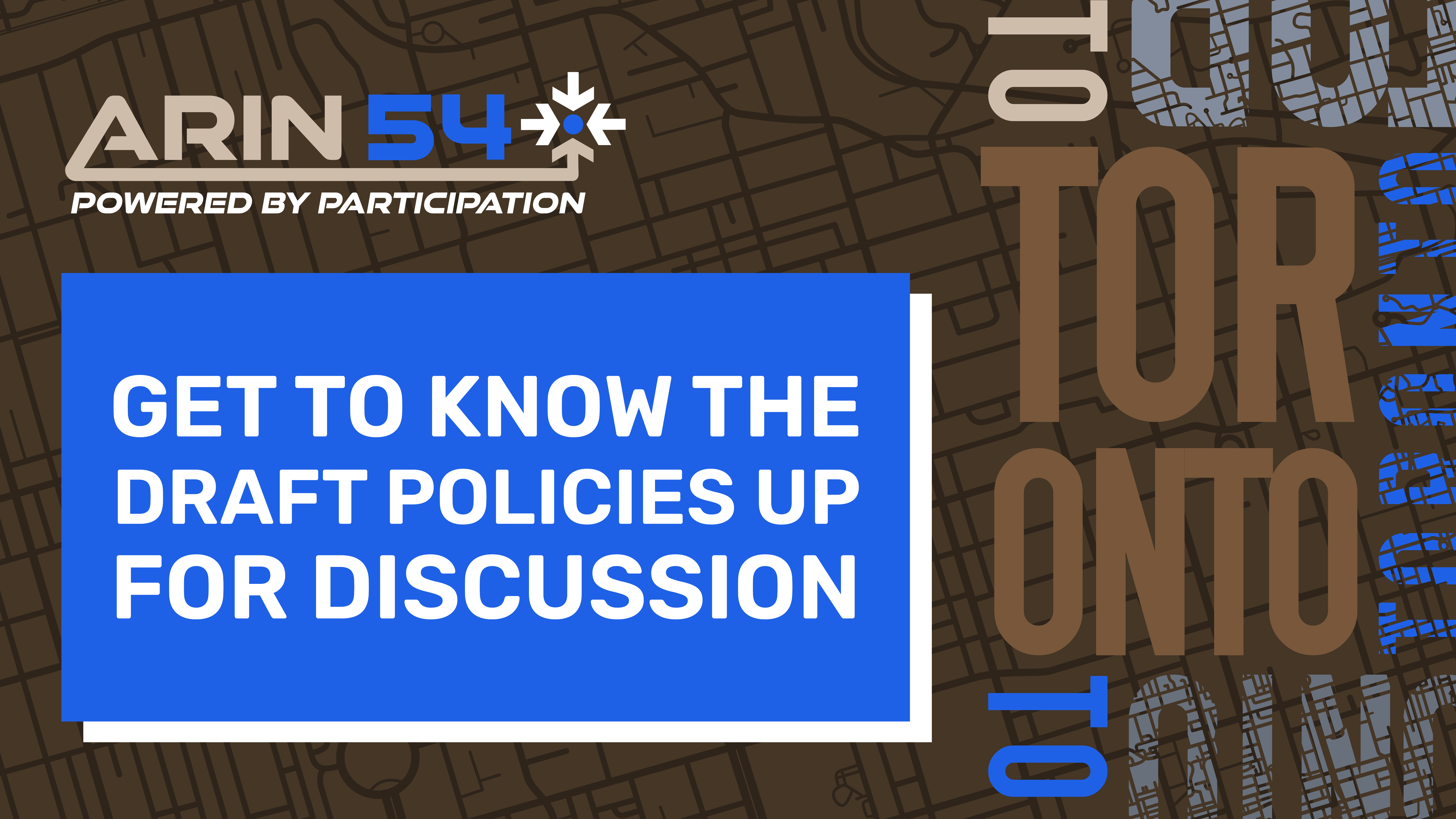
Get to Know the Draft Policies Up for Discussion at ARIN 54
It’s almost time for ARIN 54, and we are looking forward to gathering with the ARIN community both virtually and in person in Toronto, Ontario, Canada, on 24-25 October. At the last meeting, ARIN 53 in Bridgetown, Barbados, five Draft Policies and four Recommended Draft Policies were presented. Since ARIN 53, one Recommended Draft Policy was abandoned, and the remaining three Recommended Draft Policies were adopted by the ARIN Board of Trustees and were implemented on 21 August with Number Resource Policy Manual (NRPM) 2024.1. We have received seven new proposals, bringing us to a total of 12 Draft and Recommended Draft Policies to be discussed at the ARIN 54 Public Policy and Members Meeting.
To help you prepare to engage in these important conversations, here’s a look at these policy proposals. They will be discussed in two sessions on Thursday, 24 October, so be sure to mark your calendar and register today if you’d like to participate either on site in Toronto or from home via Zoom.
Recommended Draft Policies
Recommended Draft Policies have been moved to this stage of the Policy Development Process (PDP) after the Advisory Council (AC) determined they are ready to be presented to the community for final comments and consensus. Once these Recommended Drafts are presented at ARIN 54, the AC can then vote to move them to last call prior to sending them to the ARIN Board of Trustees for adoption. If community consensus is gained at ARIN 54, these Recommended Draft Policies could move on to last call and adoption; this may be the last time they are available for discussion by the community at an ARIN meeting.
ARIN-2022-12: Direct Assignment Language Update. This Recommended Draft Policy takes steps toward deprecating language around “assignments” from the NRPM by updating text for clarity and alignment with current ARIN practices in response to ARIN’s fee harmonization efforts.
ARIN-2023-7: Clarification of NRPM Sections 4.5 and 6.11 Multiple Discrete Networks. This Recommended Draft Policy aligns NRPM sections 4.5 and 6.11 with the current numbering style of the NRPM for better clarity and uniformity. Additional edits were made to include the term “allocation,” reflecting the deprecation of “assignment.”
ARIN-2024-1: Definition of Organization ID/Org ID. As a result of community feedback, this policy text was separated from ARIN-2023-7 to be reviewed as a stand-alone Policy Proposal. This Recommended Draft Policy will add a clear definition of an Organization Identifier (Org ID) to section 2 of the NRPM.
ARIN-2024-2: Whois Data Requirements Policy for Non-Personal Information. This Recommended Draft Policy clarifies ARIN’s existing practice regarding organization and contact data collection and display in Whois by clearly defining what information must be provided and registered in the ARIN Whois registry for Points of Contact and Org IDs.
ARIN-2024-9: Remove Outdated Carveout for Community Networks. This Recommended Draft Policy would retire an outdated and unused policy. The Community Networks policy was originally adopted to allow Community Networks to be issued an IPv6 /40. At the time, the smallest IPv6 block an Internet service provider (ISP) could be issued was a much larger /32. Current IPv6 policies now allow issuance of /40 to all ISPs, including Community Networks, rendering the Community Networks policy unnecessary.
Draft Policies
Draft Policies are works in progress managed by AC shepherds and presented to the community for feedback.
ARIN-2023-8: Reduce 4.1.8 Maximum Allocation. To reduce wait times on the IPv4 Waiting List, this Draft Policy would reduce the maximum IPv4 block size from a /22 to a /24. Additionally, it states that organizations that have at any point held any IPv4 space, other than special use space received under section 4.4 or 4.10, are not eligible to apply for placement on the IPv4 Waiting List.
ARIN-2024-4: Internet Exchange Point Definition. This Draft Policy intends to add a clear definition for the term “Internet Exchange Point” in the NRPM.
ARIN-2024-5: Rewrite of NRPM Section 4.4 Micro-Allocation. This Draft Policy intends to overhaul section 4.4 to modernize and clarify requirements for critical Internet infrastructure, Internet exchange points, and root and ccTLD policy.
ARIN-2024-6: 6.5.1a Definition Update. This Draft Policy intends to update a single word in section 6.5.1.a from “document” to “section” with the intention of clarifying the definition and application of Local Internet Registry (LIR) in section 6.
ARIN-2024-7: Addition of Definitions for General and Special Purpose IP Addresses. This Draft Policy intends to add clear definitions for “Special Purpose” and “General Purpose” IP addresses. Specifically, “Special Purpose IPv4 Address,” “General Purpose IPv4 Address,” “Special Purpose IPv6 Address,” and “General Purpose IPv6 Address.”
ARIN-2024-8: Restrict the Largest Initial IPv6 Allocation to /20. An IPv6 /16 is currently the largest IPv6 block size issued under initial IPv6 allocation policy. This Draft Policy suggests reducing the largest initial block size to a /20 to extend the lifespan of the available pool of IPv6 addresses.
ARIN-2024-10: Registration Requirements and Timing of Requirements With Retirement of Section 4.2.3.7.2. This Draft Policy aims to clarify and modernize reallocation requirements in section 4 by referencing standards in section 3.2, and by extending the reallocation timing from seven days to 14 days.
Participate in Our Policy Discussions
ARIN policy belongs to the community, and we encourage everyone to participate in policy discussions. We look forward to hearing your voice and ideas during ARIN 54, and we hope these simple explanations of the policy proposals on the agenda help you feel informed enough to speak up and share your opinions — or ask any questions of our AC shepherds.
For our virtual participants, you must join the meeting via Zoom as a registered attendee to participate in policy discussions. The livestream will be available on YouTube to all who wish to view the proceedings.
Contribute to the Future of Internet Policy
If you’d like to submit your own Internet number resource policy proposal, fill out our brief template and email it to [email protected]. Don’t stress about wording your proposal perfectly — our AC will work with you to polish it so it can move through the PDP.
Additional resources on the PDP can be found on the following webpages:
- Public Policy Mailing List (PPML)
- ARIN Advisory Council
- Current Number Resource Policy Manual (NRPM)
We’ll see you at ARIN 54!
Recent blogs categorized under: Public Policy
GET THE LATEST!
Sign up to receive the latest news about ARIN and the most pressing issues facing the Internet community.
SIGN ME UP →Blog Categories
Public Policy • IPv6 • IPv4 • Updates • Fellowship Program • Security • Grant Program • Caribbean • Outreach • ARIN Bits • RPKI • Internet Governance • Tips • IRR • Elections • Training • Guest Post • Data Accuracy • Business Case for IPv6 • Customer Feedback



